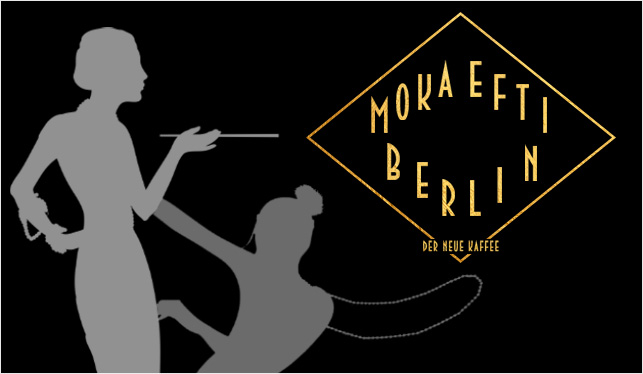
Unavailable Article No. 11991
Aroma(s) : Chocolaty, Cloves, Cinnamon, Nutty, Fruity
Article No. 11991
Moka Efti Berlin 1926

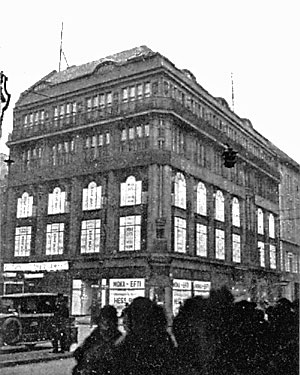 Giovanni Eftimiades arrived in Berlin from Constantinople and opened his first small café, complete with his own roasting workshop. The Greek entrepreneur, armed with an Italian passport, named his café and coffee blend after the Italian model Moka, adding the first four letters of his last name. The legendary Moka Efti café was born.
Giovanni Eftimiades arrived in Berlin from Constantinople and opened his first small café, complete with his own roasting workshop. The Greek entrepreneur, armed with an Italian passport, named his café and coffee blend after the Italian model Moka, adding the first four letters of his last name. The legendary Moka Efti café was born.
Shortly thereafter, Mr. Eftimiades acquired the "Equitable-Palast" at the corner of Leipzig and Friedrich streets and transformed it into the city's most famous and largest café. Guests had access to a total of 2,800 square meters. In addition to the café and a dance hall, it featured a fish restaurant, a hair salon, a billiard room, a chess room, and even a stenography service. A major attraction at the time was an escalator that led to the upper floors, drawing many visitors specifically for that reason.
The interior decor ranged from sophisticated elements to oriental, Arabic, and Egyptian influences. To this day, the packaging of Moka Efti coffee is a tribute to that era.
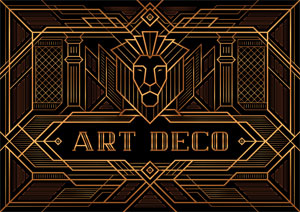
On its best days, up to 25,000 cups of coffee were served. Four music bands provided an upbeat atmosphere until the early morning hours. Berlin, during this historical period, was the nerve center of Europe. But dark times were casting shadows over the future. The global economic crisis also put Moka Efti in difficulty. In 1933, Giovanni Eftimiades was forced to sell his establishments. In 1934, the NSDAP used the rooms for propaganda events. Swing dancing was now banned. World War II completely destroyed the building.
Eftimiades had already sold his coffee brand in 1930 to an Italian company in Milan, which still roasts this wonderful coffee today and continues the tradition.
We have found the roasting workshop and brought this espresso with its multicultural heritage back home.
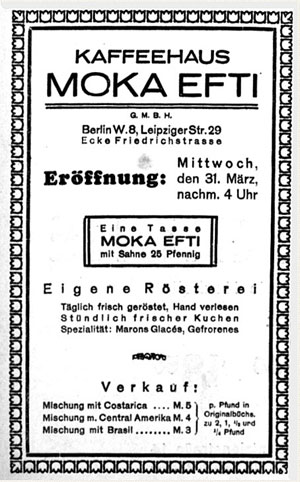 Eyewitness: Mrs. Irmgard Duhre (mother of the CEO of Espresso International) was born in Berlin in 1927 and still remembers her parents buying 250g of MOKA EFTI for their Sunday coffee.
Eyewitness: Mrs. Irmgard Duhre (mother of the CEO of Espresso International) was born in Berlin in 1927 and still remembers her parents buying 250g of MOKA EFTI for their Sunday coffee.
Back then, coffee was a luxury product, much more expensive than it is today, and it was celebrated as such. It's wonderful to see the tradition of small roasteries in cities experiencing a renaissance once again, as seen with Elbgold or Speicherstadt Coffee in Hamburg.
"Freshly roasted every day, hand-picked—fresh cake every hour." This timeless slogan still resonates today, sparking a craving for a freshly brewed cup. Though, let's admit, today we might prefer milk foam over cream, right?
Even at 91, Mrs. Duhre refuses to give up her daily coffee ritual. Perhaps this is why she remains so vivacious, actively engaging in the events of this ever-changing world.
More than any other coffee, Moka Efti's history perfectly encapsulates the challenges of guiding a brand through the tumultuous events of the past century.
Moka Efti Journey to Italy
 The story of Moka Efti soon intertwines with that of the Monti family from Milan. In 1930, Angelo Monti purchased the Moka Efti brand, driven by boldness and entrepreneurial spirit. By the mid-1930s, Moka Efti had become the official coffee supplier to the Italian royal family under King Vittorio Emanuele III.
The story of Moka Efti soon intertwines with that of the Monti family from Milan. In 1930, Angelo Monti purchased the Moka Efti brand, driven by boldness and entrepreneurial spirit. By the mid-1930s, Moka Efti had become the official coffee supplier to the Italian royal family under King Vittorio Emanuele III.
In 1957, Angelo's son, Giorgio Monti, took over the company and propelled Moka Efti to national fame. By the mid-1990s, Giorgio’s daughters, Nicoletta and Mariangela, joined the management team.

IIn 2000, Moka Efti embraced the future with a complete renovation of its roasting plant.
In 2005, the company made its first investment in coffee pod production machines, responding to market demands. Soon after, another machine was purchased to further meet the growing needs.
Moka Efti, with its long legacy, continues to rely on the expertise of a family devoted to constant research and relentless pursuit of perfection. The result is exceptional quality, made for discerning coffee lovers. (Recommended by Feinschmecker Magazine, 4/20)

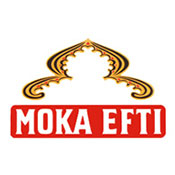 ‘To ashes - to dust': The award-winning TV series ‘Babylon Berlin’ is set in the 1920s, the ‘golden years’. The centre of all events is the great café ‘MOKA EFTI’, which actually existed. But what does the name really mean? What's the connection with Italian coffee?
‘To ashes - to dust': The award-winning TV series ‘Babylon Berlin’ is set in the 1920s, the ‘golden years’. The centre of all events is the great café ‘MOKA EFTI’, which actually existed. But what does the name really mean? What's the connection with Italian coffee?